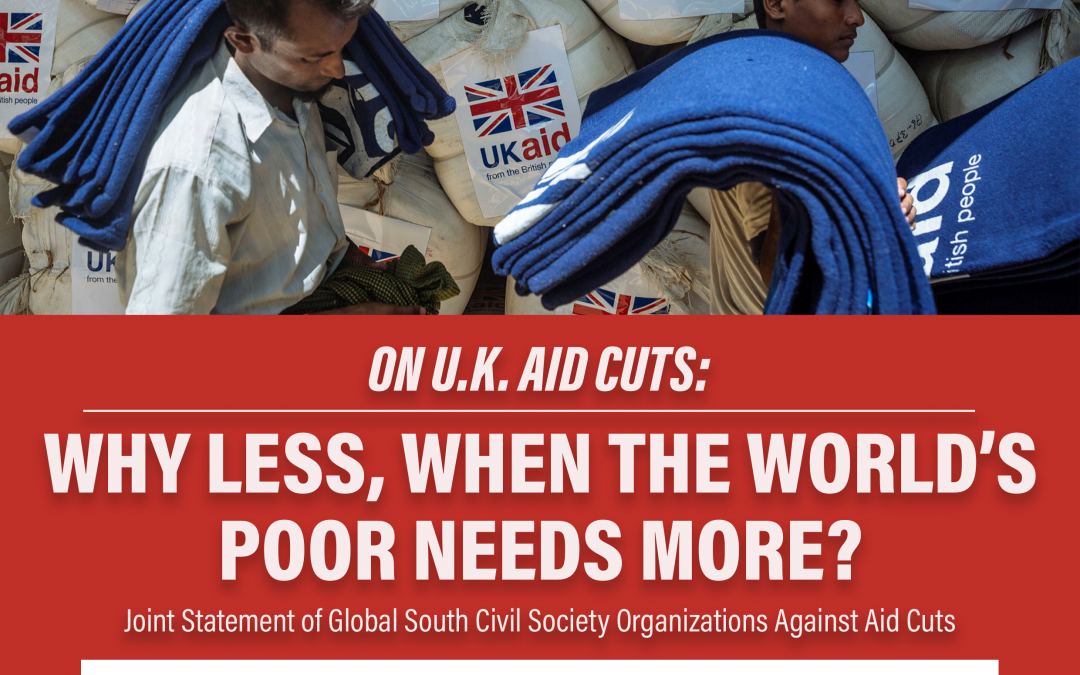On November 5th 2020, the British government announced that it would spend only 0.5% of its Gross National Income (GNI) on Official Development Assistance (ODA) – a huge departure from the legally mandated and internationally agreed target of 0.7%.[1] In a separate statement, U.K. NGOs have earlier criticized the move, and raised the alarm on the “truly shocking” lack of government transparency in implementing cuts to development aid.[2]
Earlier this year, British diplomats were reportedly ‘instructed’ to cut at least 50 percent in UK overseas bilateral aid in the next few weeks ahead of the next British fiscal year. Recent leaked documents from Foreign Office officials reinforce these reports, pointing to possible aid cuts of as much as 60% in Somalia, 59% in Sudan, 67% in Syria, 63% in Libya and 58% in Nigeria among others.[3] According to Lord Garnier, one of Britain’s most senior law officers, the British Prime Minister is under “clear legal obligation” to uphold the binding target spending on international development based on the UK Public General Act 205, c. 12, or the International Development Act of 2015.[4]
The UK government will be donating just £87 million (USD120 million) to Yemen relief efforts in the coming year–less than half of the £196.6 million (USD271.8 million) donated in 2020 and around 40% of the £214 million total (USD295.8 million) in U.K. donations to Yemen in 2020-2021. The vast reduction comes despite the government’s classification of humanitarian aid as a priority area that would be given protection from its spending cuts. This, despite the fact that “[f]amine is bearing down on Yemen,” as United Nations (UN) Secretary-General António Guterres said, with 20 million Yemenis in need of humanitarian assistance and protection.[5]
In contrast, latest figures indicate that that UK authorized the sale of USD 1.9bn worth of arms to Riyadh between July and September 2020 – a move that further puts into question the sincerity of the UK in ending the war in Yemen, according to Oxfam.
The severe impact of the aid cuts extends beyond the ongoing humanitarian crisis in Yemen. Aid agencies in Somalia for instance are being compelled to prepare for the suspension of health clinics, which serve as many as 2,000 women and children a month, after being warned of face cuts as high as 40% from their UK funding.[6] The UK aid reduction is anticipated to affect similar health development efforts in Zimbabwe, Sierra Leone, and Nigeria, where UK bilateral aid spending is a significant contributor to overall health expenditures.
The gap that would be left cannot be easily replaced by domestic resource, especially at a time when developing countries are among the hardest hit by the pandemic and the worst economic recession in decades.[7]
OUR CALLS TO ACTION
In response to growing threats to ODA levels, we call on the UK government and the donor community in general to:
- Respond holistically to the pandemic and the ensuing health and economic crises impacting peoples of the Global South the most.
- Increase ODA levels focused on health and sustain support to all existing health-related programmes and essential services that directly impact the lives of the poorest and marginalized groups.
- Follow through international commitments to meet the 0.7% GNI target without further delay consistent with the highest standards of transparency and accountability, and development effectiveness principles.
- Reverse any action that would cut humanitarian aid flows critical to responding to the needs of people affected by ongoing protracted crises especially among conflict-affected and fragile countries.
- Ensure that ODA is focused on poverty reduction, including women’s empowerment and gender equality, aligned with the Sustainable Development Goals (SDGs), the leave-no-one-behind agenda and adhere to key international agreements.
We express our full support to the ongoing campaign of our CSO colleagues in the UK against cuts to development aid. We believe that these fundamental changes to UK aid have far-reaching implications especially for the people of the Global South who stand to lose the most from drastic aid reductions.
History teaches us that changes in ODA levels are primarily anchored on political will rather than economic indicators often used to undermine official aid targets. We call on donor countries to lead by example; to give more; and to deliver better – at a time when the world’s poorest need it the most.
—-
[1] https://www.devex.com/news/exclusive-uk-fcdo-minister-we-are-not-really-in-a-position-to-discuss-cuts-with-aid-community-99159
[2] https://www.devex.com/news/uk-ngos-condemn-truly-shocking-lack-of-government-aid-transparency-98977
[3] https://www.theguardian.com/politics/2021/mar/05/uk-foreign-office-discussing-aid-cuts-more-than-50-leak-reveals
[4] https://www.standard.co.uk/news/politics/foreign-aid-cut-unlawful-rishi-sunak-b901192.html
[5] Worley, William. (1 March 2021). UK’s aid budget to Yemen slashed by nearly 60%. DevEx. Retrieved from: https://www.devex.com/news/uk-s-aid-budget-to-yemen-slashed-by-nearly-60-99281
[6] Wintour, Patrick. (2 March 2021). Somalia health clinics will close due to UK aid cuts, charity warns. The Guardian. Retrieved from: https://www.theguardian.com/world/2021/mar/02/somalia-health-clinics-will-close-due-to-uk-aid-cuts-charity-warns
[7] Worley, William. (9 February 2021). In Brief: Hole caused by UK aid cuts to health ‘unlikely’ to be replaced. DevEx. Retrieved from: https://www.devex.com/news/in-brief-hole-caused-by-uk-aid-cuts-to-health-unlikely-to-be-replaced-99116

